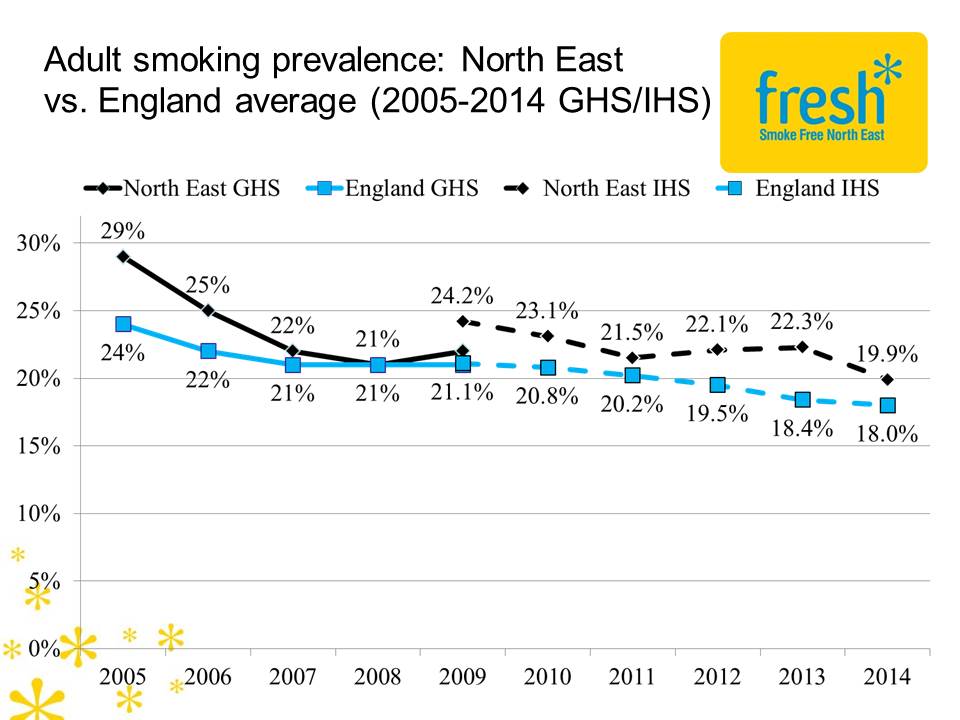North East sees biggest drop in smoking in England

NEW official figures show the North East has had the biggest drop in smokers nationwide –with fewer people smoking than ever before.
The proportion of North East smokers fell from 22.3% of people smoking in 2013 down to 19.9% in 2014. The figures are from the Integrated Household Survey published by the Office for National Statistics.
There are now 165,000 fewer smokers in the North East than there were in 2005, when 29% of people smoked. The figures have also resulted in the North East approach being praised by Public Health England.
Professor Kevin Fenton, National Director of Health and Wellbeing, Public Health England: said: “This significant drop in North East smoking rates is a credit to the hard work and commitment of local organisations who have come together to reduce the devastating harm caused by smoking. Our ultimate goal is a smokefree nation and the North East provides a model for the rest of the country in how working in partnership and focusing on this shared goal can make a difference to real lives.”
Lisa Surtees, Acting Director of Fresh Smoke Free North East, which was set up in 2005 to tackle the worst rates of smoking in the country, said: “We are thrilled to see such a significant fall in smoking. It is the first time our smoking rates have ever dropped under 20% and shows the North East has had the biggest fall of any English region since 2005.
“We have seen a massive culture shift in the last decade with regards to smoking, with smokefree laws coming into force and massive public opinion in favour of reducing smoking and protecting children from tobacco.
“But around 417,000 people still smoke tobacco in our region and one in two will die from a smoking related disease unless they quit.”
Councillor Paul Watson, chair of the Association of North East Councils, said: “I’m proud of the way other regions look to the North East for our work in tackling smoking, despite the challenges we still have.
“Smoking affects the life chances of every child who grows up to smoke, especially in some of our poorest wards. Councils have agreed that tackling smoking locally and working even more closely together to do this as a region is an ongoing priority and we have played a key part in raising our voices to demand action from the government.”
Cllr Nick Forbes, Chair of the Making Smoking History in the North East Partnership, said:
“The North East is no longer the region with the highest smoking prevalence and I am incredibly proud of the progress we have made. We have set a vision of reducing smoking rates to 5% which is a clear statement from councils, the NHS and CCGs that the North East wants to end the burden caused by smoking, which still affects poorer families and people with mental health issues the most.
“But getting down even further will mean embracing more harm reduction approaches and demanding more action nationally. It is good also to see the NHS Five Year Forward View stating the future health of millions of children, the sustainability of the NHS, and the economic prosperity of Britain all now depend on a radical upgrade in prevention and public health.”
Anna Lynch, Director of Public Health for County Durham and chair of the North East Directors of Public Health Network said: “Smoking is still our biggest cause of ill health and since public health transferred to local authorities, councils have prioritised efforts to reduce smoking locally and work together to collaborate even more closely through the Fresh approach.
“Our aim for children growing up in the North East is that they can grow up in smokefree homes, free of tobacco addiction, and don’t see the diseases smoking causes as a normal part of life. We owe it to them to make it happen.”
Ambitious plans to cut smoking rates to 5% across the North East by 2025 were backed by health and local government leaders and young people in the North East earlier in the year. It was estimated getting down to 5% would save thousands of lives and an estimated £100million a year, freeing up around £50 million for the NHS, significantly easing the strain on hospitals and GP surgeries, as well as significantly cutting the cost of smoking related sickness on local businesses. The calculations were made using the National Institute of Health and Care
Excellence’s Tobacco Return on Investment Tool.
A survey by YouGov found 89% of North East adults would like smoking to become a thing of the past for children.
